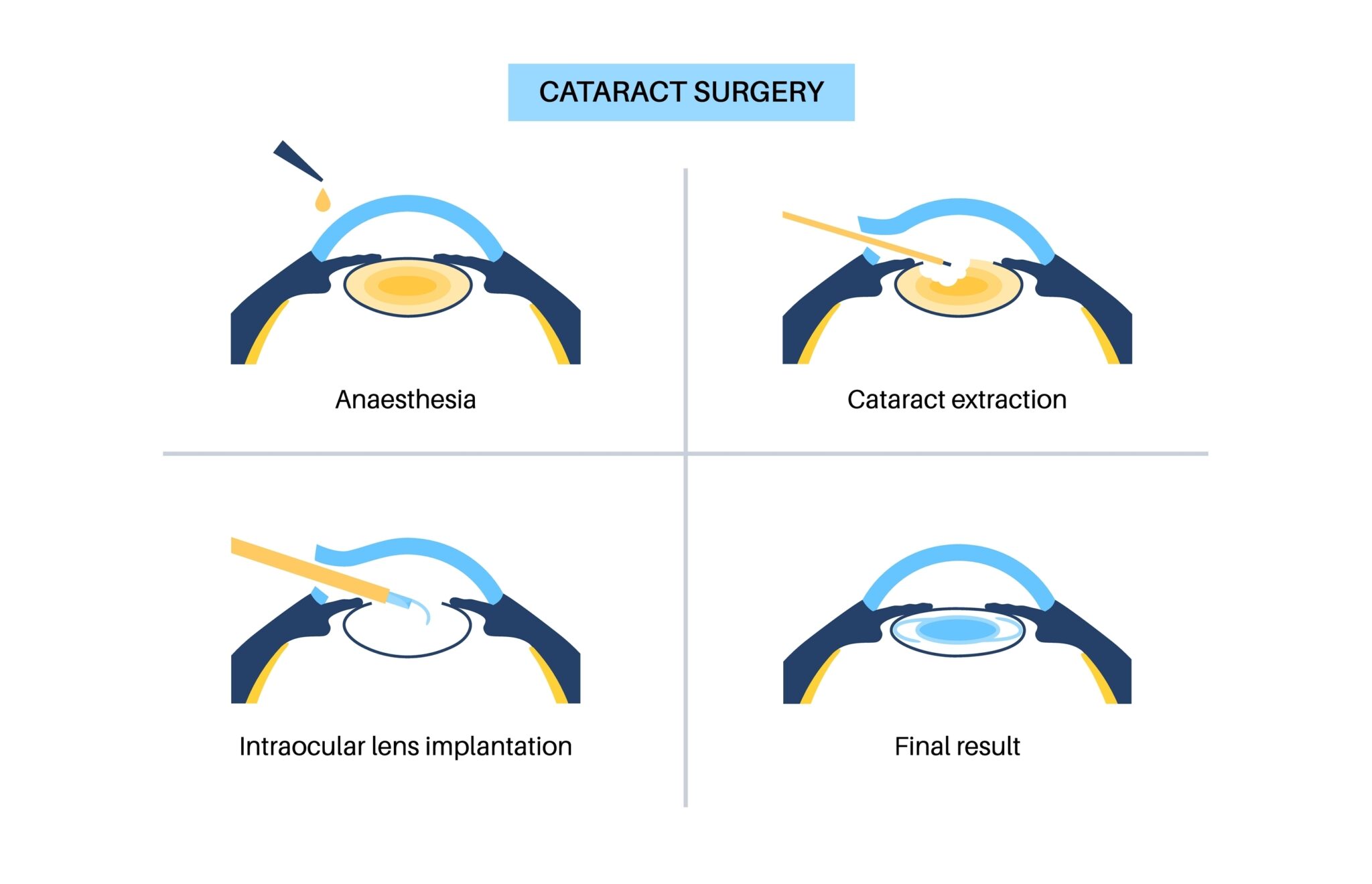Blog post by: Eye Physicians of Long Beach

Cataract surgery is a crucial step toward restoring your vision, but proper recovery is just as important to ensure the best long-term results. While you may be eager to resume your routine post-surgery, you’ll need to hold off on physically demanding activities.
Keep reading to learn more about what is considered strenuous activity and why those actions can do more harm than good when healing from cataract surgery.
What Happens During Cataract Surgery?

Cataract surgery starts with your eye doctor applying numbing eye drops to your eyes to make sure you remain comfortable throughout the procedure. Your cataract surgeon will then create a small incision in the front surface of your eye.
Through that incision, they’ll remove the natural lens where the cataract is and replace it with an intraocular lens or IOL. The new IOL allows light to pass through and focus precisely on your retina, restoring clear vision.
The incision made heals on its own and doesn’t need stitches. Finally, the surgeon will place a shield over the operated eye to protect it as it heals.
Cataract surgery is an outpatient procedure that takes less than 30 minutes to complete. Although it’s a quick procedure, your eye will require time to heal.
What Should You Expect After Cataract Surgery?
You’ll be taken to the recovery room, where you’ll be monitored for a brief period. Before being discharged, your cataract surgeon will provide personalized post-operative care instructions, including the activities you can and can’t do.
You’ll also be scheduled for follow-up visits to monitor your healing progress. It’s important that you attend all your appointments and adhere to the instructions given to ensure a smooth recovery.
Why It’s Important to Avoid Strenuous Activities After Cataract Surgery
Avoiding certain activities after your cataract surgery can ensure a successful recovery and considerably lower your risk of complications such as:
High Intraocular Pressure or IOP
Strenuous activities can increase your intraocular pressure (IOP). High eye pressure can open the incision in your eye, putting you at risk for optic nerve damage. Optic nerve damage is serious and can lead to permanent vision loss.
Lens Dislocation

Engaging in strenuous activity can also cause your IOL to shift out of place, which may lead to blurred or distorted vision.
Eye Trauma
An eye injury due to strenuous activity, while your eye is still healing, can disrupt the healing process.
Inflammation and Delayed Healing
Pushing your body too hard, too soon, can lead to increased inflammation in the eye. This not only slows down your recovery but may also increase your chances of experiencing discomfort, swelling, or infection.
What is Considered Strenuous Activity Post-Cataract Surgery?
Strenuous activity is any action that can strain your body, exert pressure on your eyes, or expose your eyes to trauma, compromising your recovery. While you may be excited to resume your regular activities post-surgery, you’ll need to wait until you’re cleared.
The good news is that you won’t have to avoid these activities for a very long time. Generally, the categories of strenuous activity include:
Can I Bend Over After Cataract Surgery?
Any activity that requires bending or putting your head below your waist should be avoided, as it could increase your eye pressure. This includes picking up items from the floor.
Many cataract surgery patients can safely resume light bending after approximately 2 to 3 days.
Can I Exercise After Cataract Surgery?

You’ll also need to take a break from moderate to high-intensity workouts such as cycling, running, yoga, contact sports, and weightlifting. Eye doctors recommend not lifting anything heavier than 10 to 15 pounds for approximately a week post-op.
Intense workouts can raise your eye pressure, dislodge your lens, or heighten the risk of eye injury. Exercise can also work up dust and other particles, which might enter your eye and cause irritation or infection.
Many patients do very light workouts after cataract surgery, such as walking. However, you may have to wait 4 to 6 weeks before resuming strenuous exercise or until your ophthalmologist clears you.
Can I Swim After Cataract Surgery?
It’s best to refrain from water-based activities. Swimming and other water activities are not only strenuous but also pose a risk of eye infection.
Water can carry chemicals that might irritate your eyes. It can also introduce bacteria into your healing eye and cause an infection.
That’s why it’s best to wait at least 2 weeks or until your ophthalmologist gives you the green light.
Can I Do House Chores After Cataract Surgery?
While you can do light house chores after your cataract procedure, like wiping down countertops, you should avoid activities that involve bending over for at least the first several days to a week.
You also won’t be able to perform heavy chores like cleaning the bathroom, mopping floors, yard work, or anything that involves straining in the first week.
These activities can elevate IOP and increase the risk of complications.
Restore Your Vision with Confidence
Cataract surgery at Eye Physicians of Long Beach can help you regain clear vision and dramatically improve your quality of life. Our team provides personalized post-operative care, including detailed guidance on when it’s safe to resume strenuous activities, so you can recover with confidence.
Are cataracts making it challenging to see? Schedule your appointment at Eye Physicians of Long Beach in Long Beach, CA, today to start your journey to a successful cataract surgery and a stress-free recovery.
